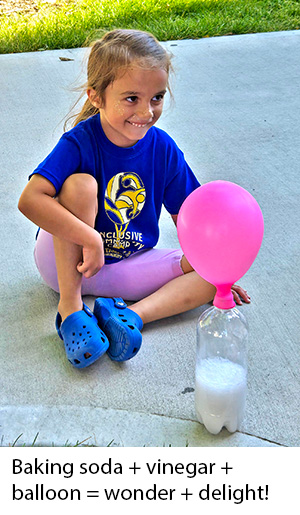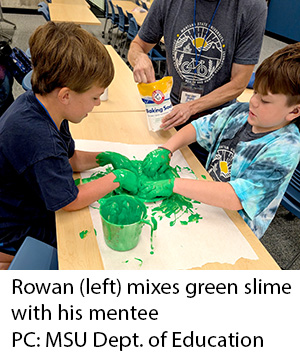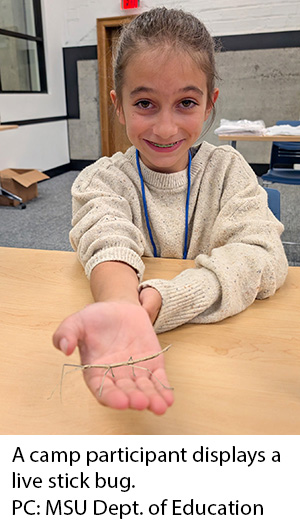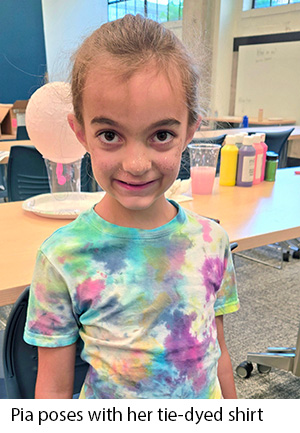 Montana NSF EPSCoR proudly continued its sponsorship of Montana State University’s Inclusive Community Camp (ICC), now in its sixth summer. In alignment with EPSCoR’s mission to broaden participation in STEM (Science, Technology, Engineering, and Math), the current SMART FIRES project provided educational supplies and supported camp activities focused on its “Sensing for Science” theme. These sensory-rich experiences served as engaging gateways to scientific exploration, sparking curiosity in campers of all abilities.
Montana NSF EPSCoR proudly continued its sponsorship of Montana State University’s Inclusive Community Camp (ICC), now in its sixth summer. In alignment with EPSCoR’s mission to broaden participation in STEM (Science, Technology, Engineering, and Math), the current SMART FIRES project provided educational supplies and supported camp activities focused on its “Sensing for Science” theme. These sensory-rich experiences served as engaging gateways to scientific exploration, sparking curiosity in campers of all abilities.
Hosted by MSU’s College of Education, Health and Human Development, ICC is a vibrant STEAM (Science, Technology, Engineering, Arts, and Math) camp that brings together young learners with diverse support needs and aspiring educators from MSU’s Master of Arts in Teaching (MAT) program. The camp’s tiered mentorship model pairs each rising 1st–4th grade camper with a middle school mentor, who is in turn supported by a MAT graduate student serving as a camp guide.
 Madeline, an MAT camp guide, shared that she was impacted by “...the realization that every single kid is different, and you need to adjust things to make them fun and spark their interest so they can learn better.” Her insight reflects the camp’s commitment to adaptive, student-centered learning. Fellow guide Caleb added, “I’ve developed a stronger ability to help these younger kids work through their frustrations… It’s tough to do this in my larger classroom with older kids, so having the chance to practice 1-on-1 and in small groups has been incredibly valuable.”
Madeline, an MAT camp guide, shared that she was impacted by “...the realization that every single kid is different, and you need to adjust things to make them fun and spark their interest so they can learn better.” Her insight reflects the camp’s commitment to adaptive, student-centered learning. Fellow guide Caleb added, “I’ve developed a stronger ability to help these younger kids work through their frustrations… It’s tough to do this in my larger classroom with older kids, so having the chance to practice 1-on-1 and in small groups has been incredibly valuable.”
ICC was originally inspired by a Bozeman-area parent who identified a lack of affordable summer programs that welcomed children with a range of support needs. In response, the College of EHHD created ICC as a space where children of varying abilities could learn, play, and grow together.
 This year, campers explored optics and photonics with MSU researchers, tackled engineering challenges, and interacted with insects during a visit from two entomologists. “The kids were thrilled!” said Dr. Sarah Pennington, Associate Professor of Education and the camp’s curriculum lead. “They got to pet a hissing cockroach, hold a stick bug, and learn about fascinating animal adaptations. Watching them light up with excitement and ask questions was fantastic.”
This year, campers explored optics and photonics with MSU researchers, tackled engineering challenges, and interacted with insects during a visit from two entomologists. “The kids were thrilled!” said Dr. Sarah Pennington, Associate Professor of Education and the camp’s curriculum lead. “They got to pet a hissing cockroach, hold a stick bug, and learn about fascinating animal adaptations. Watching them light up with excitement and ask questions was fantastic.”
 Campers themselves were quick to name their favorite moments. Pia, age 8, loved the tie-dying workshop, and Miela, age 10, said, “All of our experiments have been really, really fun—especially making the slime!” Slime-making was also a big hit among middle school mentors, like Rowan, age 11, who said it was a “gooey mess but really awesome!” Ella, age 13, got the most out of “Having fun and laughing about stuff.”
Campers themselves were quick to name their favorite moments. Pia, age 8, loved the tie-dying workshop, and Miela, age 10, said, “All of our experiments have been really, really fun—especially making the slime!” Slime-making was also a big hit among middle school mentors, like Rowan, age 11, who said it was a “gooey mess but really awesome!” Ella, age 13, got the most out of “Having fun and laughing about stuff.”
Dr. Pennington noted that this year’s smaller camp size helped deepen connections among participants. “We had several sibling pairs, and it was wonderful to see how their unique personalities came through in the 1-on-1 interactions with mentors and guides. Many of our campers are repeat attendees—some return as mentors after having been campers themselves.”
Thanks to the continued support of supporters like Montana NSF EPSCoR, ICC remains a model for inclusive, hands-on STEAM education. By investing in sensory-based learning and mentorship, SMART FIRES is helping shape the next generation of scientists, educators, and leaders—one bag of slime and tie-dyed T-shirt at a time!
For more information, visit the Inclusive Community Camp website.